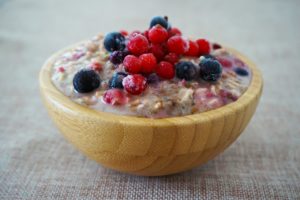How many questions do you have about nutrition for runners? Am I fueling properly? Are these foods healthy? Am I eating too much? What should I eat before a race?

If you have similar questions, we have you covered! To address these questions, and many more, we’ve developed Nutrition for Runners. This email series and our program are filled with guidelines, case studies, common mistakes, recipes, expert interviews, and various training plans tailored to your goals.
In today’s podcast, I invited my partner on this program, Anne Mauney, to give you some high level strategies for fueling as a runner. I collected your questions from Twitter and Instagram (as I often do, so make sure to connect on there) to take a deep dive on a variety of topics.
Most nutrition questions center around the quality and quantity of food. Specifically, quality can refer to the healthfulness of a particular meal or the balance of nutrients. Quantity related questions are often around too much or too little of calories, carbohydrates, fats, and proteins.
There are no simple answers. Mostly: “it depends.”
Factors such as your goals and your current health, weight, and fitness level are all relevant. In today’s episode, we dig into some specifics to help guide your nutrition.
Anne Mauney’s Sustainable Approach to Nutrition
Anne Mauney is a certified Registered Dietitian, has a master’s in public health, she has taught at George Washington University in Washington, DC, and has run dozens of half marathons and marathons. Her work has been featured in Glamour, The Washington Post, Woman’s Day, and in many other publications.
She writes a nutrition and lifestyle blog at fannetasticfood.com and runs her own private counseling practice from annetherd.com.
I admire her approach to nutrition because it’s sustainable, well balanced, and supported by science.
In this episode we discuss fueling strategies before and after a race. We even throw in some bonus tips on how to avoid mountain lions.
We also explore strategies for weight loss and avoiding type 2 diabetes. For the record, normal fasting glucose levels should be below 100 mg/dl and we address this in the episode.
Check out a short preview here and listen to the full episode below.
Everyone will learn something from this conversation with Anne. I know I always do!
Subscribe to the podcast in iTunes, Spotify, Stitcher, iHeartRadio, or Google Play.
Listen to the entire episode:
Show Links & Resources:
- Find Anne at: fannetasticfood.com and annetherd.com
- Connect on Instagram and Twitter
- Recipes for fueling your runs:
- Nutrition for Runners
Thank You Gatorade Endurance!

This episode is made possible by support from Gatorade Endurance. Use code Strength20 for 20% off at GatoradeEndurance.com.
Reformulated in 2017 to be even more effective, Gatorade Endurance Formula is a specialized sports drink. That means it has higher amounts of sodium and potassium to help sustain hydration, maintain proper fluid balance, and replace key electrolytes that you lose when you’re running.
Plus, it has no artificial sweeteners or flavors and has a lighter flavor designed for athletes training longer. I know the last thing I want when I’m two hours into a long run is a strong flavor that might turn my stomach.
Gatorade Endurance Formula also now offers a multi-carbohydrate blend to help you dial it in and maintain performance over much longer runs. Different carbs are utilized at different rates, so this advancement helps you both run longer and lower any risk of stomach distress because it won’t be working so hard all at once.
You can check out all of their flavors, including caffeinated and non-caffeinated options, at GatoradeEndurance.com and don’t forget to use code Strength20 for your 20% discount.